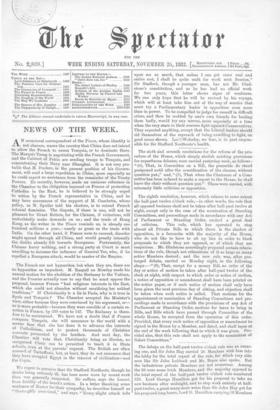The eighth resolution, however, which relaxes to some extent the
half-past twelve o'clock rule,—in other words, the rule that all opposed business shall not be taken after half-past twelve at night, except only in the case of the nomination of Standing Committees, and proceedings made in accordance with any Act of Parliament or Standing Order, excited a great deal of criticism. This rale, which has operated to stop almost all Private Bills to which there is the shadow of opposition, is a favourite with the majority of the House, who do not like to have to sit up late in order to block proposals to which they are opposed, or of which they are suspicious. Mr. Gladstone accordingly proposed certain relaxa- tions of the rule, though not relaxations of it as large as many active Members desired ; and the new rule was, after pro- longed debate, carried on Monday night, in the following shape :—" (8), That, except for a money Bill, no order of the day or notice of motion be taken after half-past twelve of the clock at night, with respect to which order or notice of motion, a notice of opposition or amendment shall have been printed on the notice paper, or if such notice of motion shall only have been given the next previous day of sitting, and objeotion shall be taken when such notice is called. That motions for the appointment' or nomination of Standing Committees and pro- ceedings made in accordance with the provisions of any Act of Parliament or Standing Order, motions for leave to bring in Bills, and Bills which have passed through Committee of the whole House, be excepted from the operation of this order. Provided, that every such notice of opposition or amendment be signed in the House by a Member, and dated, and shall lapse at the end of the week following that in which it was given. Pro- vided also, that this rule shall not apply to the nomination of Select Committees."


































